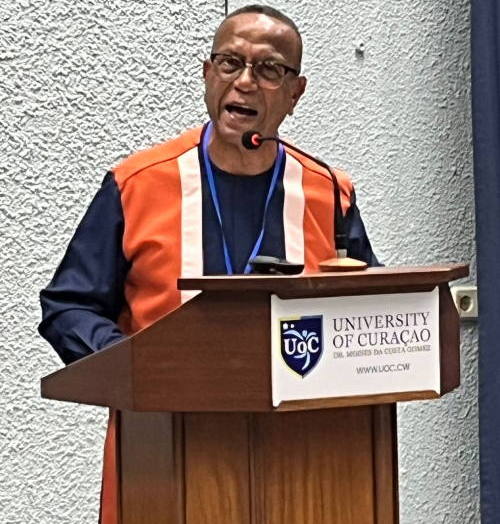 PHILIPSBURG:--- Former Prime Minister and Minister of Education, Culture, Youth and Sport of Sint Maarten, Wycliffe Smith, was the sole representative from Sint Maarten at the international conference “Christianity and Slavery in the Dutch Caribbean Islands, Surinam, and the Netherlands,” held November 10–14 at the University of Curaçao.
PHILIPSBURG:--- Former Prime Minister and Minister of Education, Culture, Youth and Sport of Sint Maarten, Wycliffe Smith, was the sole representative from Sint Maarten at the international conference “Christianity and Slavery in the Dutch Caribbean Islands, Surinam, and the Netherlands,” held November 10–14 at the University of Curaçao.
The conference was organized by the University of Curaçao, the Protestant Theological University of Utrecht, and the Free University of Amsterdam. It brought together scholars and clergy and researchers from the Netherlands, the USA, Africa, Surinam, Indonesia, Jamaica, Barbados, Trinidad, Aruba, and Curaçao. Over four days, participants examined how Christian denominations shaped, supported, or resisted the structures of slavery throughout the Dutch colonial world. With some 40 presentations delivered, the event offered a rich comparative view of religion’s role during the era of enslavement.
Only two presentations focused on the Dutch Windward Islands. Ms. Alma Louise de Bode-Olten presented on the Anglican/Episcopal Church in Saba, St. Maarten, and St. Eustatius. Smith’s presentation followed, entitled “The Role of the Christian Church in the History of Slavery on the Dutch Windward Islands (1643–1863),” which was met with enthusiasm for its clarity, depth, and historical precision.
Drawing on extensive archival research, Smith compared the six major churches active on St. Eustatius, Saba, and St. Maarten during slavery: the Dutch Reformed, Lutheran, Presbyterian, Anglican, Methodist, and Roman Catholic churches. He emphasized that the first four, aligned closely with the colonial powers, offered little spiritual outreach to the enslaved. Their ministries largely excluded the enslaved population, reflecting the social and racial divisions of the time.
In contrast, the Methodist and Roman Catholic churches sought to evangelize the enslaved, promote literacy, and encourage moral and spiritual development. Smith highlighted how these churches became vital spaces of dignity, community, and hope, offering the enslaved a faith that empowered rather than suppressed.
Smith also pointed to the striking legacy of these contrasting approaches. The Reformed, Lutheran, and Presbyterian churches, once influential among the colonialists, have largely disappeared from the islands. The Methodist and Catholic churches, however, remain vibrant, “filled with the descendants of those who were once denied entry,” he noted. His closing line resonated deeply with attendees: “That, brothers and sisters, is God at work. The gospel that was meant to control the enslaved became the gospel that set them free.”
On the final day, participants toured several historic religious sites on Curaçao, including the island’s earliest Dutch Reformed and Roman Catholic churches; spaces where the intersections of faith and slavery remain preserved until this day.
Smith shared that he is finalizing his research for publication and is in discussion with House of Nehesi Publishers. His forthcoming work will offer an important contribution to the understanding of the complex role that Christianity played on the Dutch Windward Islands.
Through his presentation, Wycliffe Smith ensured that the stories of St. Maarten, Saba, and St. Eustatius were firmly represented within the broader Caribbean narrative of faith, oppression, resilience, and redemption.